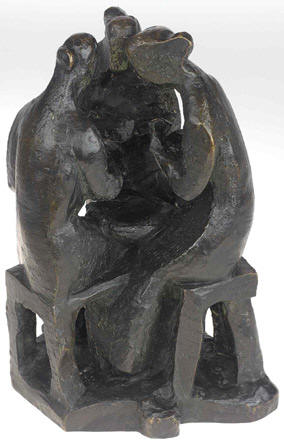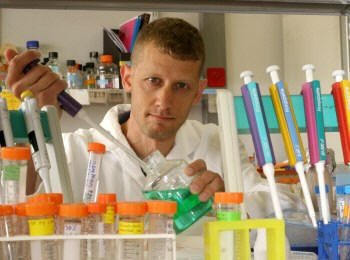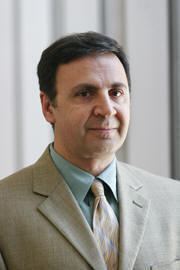|
San
Diego Jewish World
|
|||||||||
|
This Resolution echoes the recommendations of the
Baker-Hamilton Commission and other distinguished experts
who have called on the United States to engage in high-level
diplomatic efforts in support of a just and lasting peace.” "The effects of the Israeli-Palestinian conflict are not limited to the parties in conflict, or even the region – the effects are felt throughout the global community, and as a leader in this community, we must dedicate ourselves to finding a lasting solution to this conflict. I am hopeful that this Resolution motivates President Bush to undertake robust diplomacy with leaders in the region to achieve peace between Israelis and Palestinians.” Hagel said: “This resolution underscores the reality that the Israeli-Palestinian conflict frames and influences everything in the Middle East region. "I recently returned from a nine-day trip to Jordan, Israel, the Palestinian territories and Lebanon. Nearly every leader and government official that I met stressed the urgency for new U.S. leadership efforts to revive the Israeli-Palestinian peace process. "There will be no stability or security in the Middle East until all parties reach a higher ground of resolution based on common interests.” (Jump to continuation)
Hebrew
University Ph.D. wins Kaye Award for ‘natural protection’ to reduce spread of
Alzheimer’s Disease
The
foregoing article was provided by the Hebrew University, Jerusalem
Born in Belgrade Yugoslavia, Ladany at the age of eight was sent to the Bergen-Belsen concentration camp during the Holocaust. In 1997, Ladany's memoirs, The Walk to the Olympics were published in Hebrew. One of the best race walkers in the world in the 1960s and 1970s, Ladany competed in two Olympiads for Israel. At the 1968 Mexico City Games, Ladany finished in 24th place in the 50-km walk with a time of 5 hours, 1 minute, and 6 seconds. He then returned to the Olympics at the 1972 Munich Games as Israel's sole male representative in track and field. He again competed in the 50-km walk and improved to finish in 19th place with a time of 4 hours, 24 minutes and 38 seconds. The morning after his race, Palestinian terrorists broke into the Olympic Village with the intention of taking the entire Israeli delegation hostage. Eleven Israelis were killed by the terrorists, but Ladany and four others escaped. Despite Ladany’s high-level full devotion to sports, he “moonlighted” as a scientist and University Professor, pursuing a very successful academic career. As such, as a side-line of his research activity, he became a world leader in the development of the field of Operations Research in Sports, becoming the pioneer researcher and publisher of scientific articles in the field, the editor of books and of special-issues of scientific journals devoted to the subject, and the author of the “Management Science Applications to Sports” entry in 2 issues of the Encyclopedia of Operations Research and Management Science. Shaul was described by the Council of the Olympic Order as “an extraordinary example of an athlete in an area not highlighted by the media, who nevertheless devoted a life-time to vigorous time-consuming and exhausting sport with top achievements at the highest possible levels during a period of over 40 years. He is an example of an amateur athlete (in a field in which money is not involved) that should be an example to others. He is a role model others should aim to imitate, to excel in sports to the highest possible level and to stay there for a life-time, and simultaneously to combine it with excellence in science or in other gainful activity – it is evident that the I.O.C. must bestow him with the award.”
The
foregoing article was provided by Ben Gurion University of the Negev.
Brandeis
taps Nader Habibi for Middle East Studies
“We are pleased to welcome Professor Habibi to Brandeis and the Crown Center for
Middle East Studies,” said Shai Feldman, the Judith and Sidney Swartz Director
of the Crown Center. “He has broad knowledge and understanding of the economics
of the countries in the Middle East. His blend of private sector expertise and
teaching experience will be a great asset to the Crown Center.” Habibi, a native of Iran, most recently served as managing director at Global Insight, where he headed the international forecasting firm’s Middle East and North Africa Division in the Country Intelligence Group. His responsibilities included political and economic analyses and assessment of investment risk of oil-exporting countries in the Persian Gulf region. He also supervised the macroeconomic forecasting activities for the division.
Habibi spent two years at Yale University, where he was a visiting scholar in
the Department of Economics, a research fellow at the Council for Middle East
Studies, and the Rice Family Fellow Habibi has vast international teaching experience. He was an assistant professor of economics at Bilkent University in Turkey; served as chair of the Department of Economics at the Institute for Research in Planning and Development in Tehran; was vice president for research at the Iran Banking Institute; and was a member of the economics faculty at Bu Ali Sina University in Hamadan, Iran.
Habibi earned his bachelor’s degree in computer science and economics from Ball
State University in 1982. He received his master’s (system science and
operations research, 1984) and doctorate (economics, 1987) from Michigan State
University.
I love Israel in the Springtime... But while it lasts, spring in the Judaean Hills is particularly lovely. There are folk who traipse to the north of the country—Galilee or even the Golan Heights—to admire the wild flowers, but there is no need to look further than one’s own back yard, metaphorically speaking, to find the glories of spring in Israel. My daily drive to work gives me the option of taking the highway or meandering through the Jerusalem Forest. I generally prefer the latter, whatever the season, even though it makes my journey longer. I keep my eyes on the road, of course, but I can still see clumps of wild cyclamen in fashionable shades of pink and mauve peeping from behind rocks. The wild almond trees, though, are the first to blossom, and it is heartening to see their white branches gleaming amidst the bare winter trees. Later on purple spikes of wild lupin can be seen amid the grey-green wild grass, offset by yellow mimosa bushes. Other trees produce green shoots, but the Judas Tree stands apart, ablaze with red-mauve blossoms. Its Hebrew name, ‘Glory of the Forest,’ is far more apt than the English one that evokes the crucifixion (Judas is supposed to have hanged himself from its branches). Broom and gorse also abound beside the road in sunbursts of yellow, alongside scarlet poppies and other flowers whose names I do not know, but who saturate my morning commute with glorious colour.
The foregoing article was reprinted from the
AJR
Journal (Association of Jewish Refugees) in England.
*San
Diego Port Commissioner Laurie Black says she will emphasize
waterfront development during her term, and also will keep in close touch
with the San Diego City Council, which appointed her. An
interview with Evan McLaughlin is on today's Voice of San Diego.
In the San Diego Union-Tribune meanwhile there is a
story by Maureen Magee on Black's appointment to the commission.
Date: June 8, 2007 QUESTION: Speaking of administrations, for the Bush Administration
during these years, things have gone from when -- and you've been President
Bush's political advisor since he was the candidate Bush. You've got a Middle
East that's -- no peace still as -- you know, you've got the "axis of evil"
countries. Iraq is pretty nasty right now. Iran and North Korea are still
problems. Even Pakistan is getting a little bit dicey these days. SECRETARY RICE: Now, six years ago, al-Qaida was planning to attack the Twin Towers. It wasn't a very nice world. And I think that if you think about six years ago, al-Qaida was preparing to attack the Twin Towers, Pakistan was allied with the Taliban, Afghanistan was the base from which al-Qaida was going to operate; the Israelis and the Palestinians had given up on a chance for -- or let me put it, the Palestinians had walked away from a chance for a Palestinian state, launched the second intifada, elected Ariel Sharon who basically said there would never be a Palestinian state and there will be a greater Israel; the North Korean were cheating on a deal that they had just signed; China and others were indifferent to that because it was a U.S.-North Korea bilateral deal; Iran was cheating on the IAEA out of sight. I could go on and on and on. That was the world in 2000 and 2001. And there is no doubt that by confronting -- oh, by the way, and Saddam Hussein was shooting at our pilots regularly in the no-fly zone and making a mockery of the Oil-for-Peace -- Oil-for-Food program and corruption was running rampant in that program. So, a worse world? I think so. And I think that what this President has done is in some ways comparable to beginning to set up the long struggle that we are going to have to resolve particularly the problem of the growth of extremism in the Middle East, which was clearly there underneath the surface and exploded on September 11th so that we finally knew what the real problem was. The real problem wasn't just that there were extremists. It's that they were pretty widespread, they were very well networked, they were operating in lots of countries including our own. We couldn't even figure out that they were talking to one another from San Diego to someplace in the Middle East about Afghanistan. I don't think we were in better shape. And so by confronting this problem, they now have come to the surface to fight. And whether it is in the war on terror and now a much more extensive -- a pretty -- a very extensive, in fact, network of intelligence and information-sharing and law enforcement capability worldwide that can pass information as rapidly as we did to break up these various plots; to a coalition now of states that have twice voted for Chapter 7 resolutions against Iran, whose activities were to date hidden; to a coalition of states that reacted to the North Korean nuclear test in a way that actually now produced an agreement on getting the North Korean nuclear program first stopped and then, it is my hope, beginning to reverse it; to a Middle East in which Likud, the party of Ariel Sharon, split to produce a party that now accepts a two-state solution and accepts that there will be no greater Israel. You know, I think there's a lot of progress. Now, will we see the end of all of this? Maybe not. But when you're confronted with a fundamentally changed strategic set of circumstances, you can try to put band-aids on it or you can say we're going to have to deal with the root problems here and it may take a long time and it may take successive administrations to succeed. But we know what we have to put in place so that successive administrations can succeed, and you don't get there by covering the problems or trying to find a temporary solution to them that isn't worth the paper that it's written on. You know, you've all heard me say that I was lucky enough to be here the last time for the end of a big historic transformation. But that was an historic transformation that was begun by people like Marshall and Vandenberg and Acheson, when things looked pretty awful. You know, when the question wasn't: Is there going to be a communist Eastern Europe? It was was there going to be a communist Western Europe in 1946 and 1947, the kind of origin of the Marshall Plan and the Truman Doctrine. And when the question was would there be an Israeli state and when the question -- a Jewish state, and when the question was, okay, so you had to permanently divide Germany, could you make one part of Germany more successful than the other. And when the Soviet Union was, you know, exploding a nuclear weapon five years ahead of schedule and the Chinese communists won their revolution and the Korean War broke out -- speaking of the Korean analogy. And over an extended period of time, you can go back and look at any one of
those issues that in those days must have looked insoluble and that we were on
the wrong side, every single one of them has worked out to our advantage. And I
think that you will see that we've now -- we're here at the beginning of a big
historic transformation, and some of them may still work out on our watch and
some of them may not. But now if you -- if you -- with all due respect, if you
try to judge what you should do by today's headlines, you miss the fact that
history's judgment is rarely the same as today's headlines. _______________________________________________ The Jewish Grapevine  -------------------------------------------------------------------------------------------------------------------------------------
-------------------------------------------------------------------------------------------------------------------------------------JEWISH STORY EVERYWHERE—Bruce Kesler spotted the article in the Riverside Press-Enterprise about Navy Lt. Laurie Zimmet, who says one of her fondest memories of her service in Iraq was attending a Chanukah service... Sam Zeiden of Oceanside, on a visit to Modesto to attend the high school graduation of his grandson Edward Zeiden, was pleased to find an item in the "Beliefs and Issues" column of today's Modesto Bee about a Florida company that is selling kippot for Jewish athletes competing in track events... (Return to top)
Jewish Museum in Prague spotlights Otto Guttfreund PRAGUE, CZECH REPUBLIC (Press Release) —The 2nd of June of this year marked the 80th anniversary of the tragic death of the most important Czech modernist sculptor Otto Gutfreund. Gutfreund was born into a Jewish family in Dvůr Králové on 3 August 1889, the fourth son of Karel and Emilie Gutfreund. After attending pottery school in Bechyně (1903–06), he moved on to the figurative and ornamental modeling department at the Prague Academy of Applied Arts (1906–09) and then to the Paris Académie de la Grand Chaumière with Antoine Bourdell. His first shows were held before the First World War as part of the exhibitions of the Fine Artists’ Group. During the first two years of the war he was engaged in battle in Alsace as a member of the Foreign Legion. In 1916, however, he was required to spend the rest of the war in the Saint Michel de Frigolet and Blanzy internment camps.  After
his release in January 1919 he returned to the newly established Czechoslovakia.
In Prague he became a member of the Mánes Fine Artists’ Group. He lived
alternately in his home town of Dvůr Králové and in Prague, where he was
regularly involved in Mánes exhibitions. In 1921 he took part in the third
exhibition of the group Tvrdošíjní and gained numerous public commissions. In
1926 he was appointed professor at the Prague Academy of Applied Arts. One
sultry afternoon, on 2 June 1927, he drowned whole swimming in the River Vltava
near Shooter’s Island. After
his release in January 1919 he returned to the newly established Czechoslovakia.
In Prague he became a member of the Mánes Fine Artists’ Group. He lived
alternately in his home town of Dvůr Králové and in Prague, where he was
regularly involved in Mánes exhibitions. In 1921 he took part in the third
exhibition of the group Tvrdošíjní and gained numerous public commissions. In
1926 he was appointed professor at the Prague Academy of Applied Arts. One
sultry afternoon, on 2 June 1927, he drowned whole swimming in the River Vltava
near Shooter’s Island.
The preceding article was provided by the Jewish Museum in Prague (Return to top)
Senate Resolution...
The Resolution: 1. reaffirms the Senate’s commitment to a true and lasting solution to the Israeli-Palestinian conflict, based on the establishment of two states, the State of Israel and Palestine, living side by side in peace and security, and with recognized borders; 2. denounces the use of violence and terror and reaffirms its unwavering commitment to Israel’s security; 3. calls on President Bush to pursue a robust diplomatic effort to engage the State of Israel and the Palestinian Authority, begin negotiations, and make a two-state settlement a top priority; 4. urges President Bush to consider appointing as Special Envoy for Middle East Peace an individual who has held cabinet rank or someone equally qualified, with an extensive knowledge of foreign affairs generally and the Middle East region in particular; 5. calls on the Hamas-led Palestinian Authority to recognize the State of Israel’s right to exist, to renounce and end all terror and incitement, and to accept past agreements and obligations with the State of Israel; 6. calls on moderate Arab states in the region to intensify their diplomatic efforts toward a two-state solution and welcomes the Arab League Peace Initiative; and
7. calls on
Israeli and Palestinian leaders to embrace efforts to achieve peace and
refrain from taking any actions that would prejudice the outcome of final
status negotiations.
|

 A
graduate student in biological chemistry at the Hebrew University of Jerusalem
has, however, developed an approach that holds out promise of providing natural
brain protection against the spread of this disease. For his work, Erez Podoly,
a joint student of Dean of Science Prof. Hermona Soreq and the head of the
Wolfson Center for Applied Structural Biology, Prof. Oded Livnah, was one of the
winners of this year’s Kaye Innovation Awards, presented on June 6 during the
70th meeting of the Hebrew University Board of Governors.
A
graduate student in biological chemistry at the Hebrew University of Jerusalem
has, however, developed an approach that holds out promise of providing natural
brain protection against the spread of this disease. For his work, Erez Podoly,
a joint student of Dean of Science Prof. Hermona Soreq and the head of the
Wolfson Center for Applied Structural Biology, Prof. Oded Livnah, was one of the
winners of this year’s Kaye Innovation Awards, presented on June 6 during the
70th meeting of the Hebrew University Board of Governors.  One of
the greatest race-walkers in history, Ladany still holds the world record in the
50-mile walk (7:23:50), and the Israeli national record in the 50-km walk
(4:17:07 —set in 1972). He began his athletic career as a marathon runner, but
turned to walking in the early 1960s. In 1972, Shaul won the gold medal in the
100-km (9:31:00) at the World Championships. He also won the Israeli national
walking championships 28 times from 1963-1988; won the U.S. walking championship
six times (from 1973-1981); the championship in Belgium twice (1971 and 1972);
in Switzerland in 1972, and in South Africa in 1975. In 1976, Shaul became the
first person ever to win both the American Open and Masters (40 years and over)
75-kilometer walking championship. He repeated the feat in 1977 and 1981 (by
which time the event had become a 100-km race). Ladany also won the 20-km, and
50-km walk at the 1973 Maccabiah Games. and at age 70 in 2006, set in Ohio, USA,
the 100 mile World Record (21:45:34 hours) for the 70-74 age group.
One of
the greatest race-walkers in history, Ladany still holds the world record in the
50-mile walk (7:23:50), and the Israeli national record in the 50-km walk
(4:17:07 —set in 1972). He began his athletic career as a marathon runner, but
turned to walking in the early 1960s. In 1972, Shaul won the gold medal in the
100-km (9:31:00) at the World Championships. He also won the Israeli national
walking championships 28 times from 1963-1988; won the U.S. walking championship
six times (from 1973-1981); the championship in Belgium twice (1971 and 1972);
in Switzerland in 1972, and in South Africa in 1975. In 1976, Shaul became the
first person ever to win both the American Open and Masters (40 years and over)
75-kilometer walking championship. He repeated the feat in 1977 and 1981 (by
which time the event had become a 100-km race). Ladany also won the 20-km, and
50-km walk at the 1973 Maccabiah Games. and at age 70 in 2006, set in Ohio, USA,
the 100 mile World Record (21:45:34 hours) for the 70-74 age group.
 Effective
July 1, Habibi will join the Department of Economics faculty and become part of
Brandeis' Crown Center for Middle East Studies. He will teach students, conduct
research, and represent the Crown Center at conferences.
Effective
July 1, Habibi will join the Department of Economics faculty and become part of
Brandeis' Crown Center for Middle East Studies. He will teach students, conduct
research, and represent the Crown Center at conferences. 
 Jews
in the News
Jews
in the News
 News Sleuths:
News Sleuths: 
